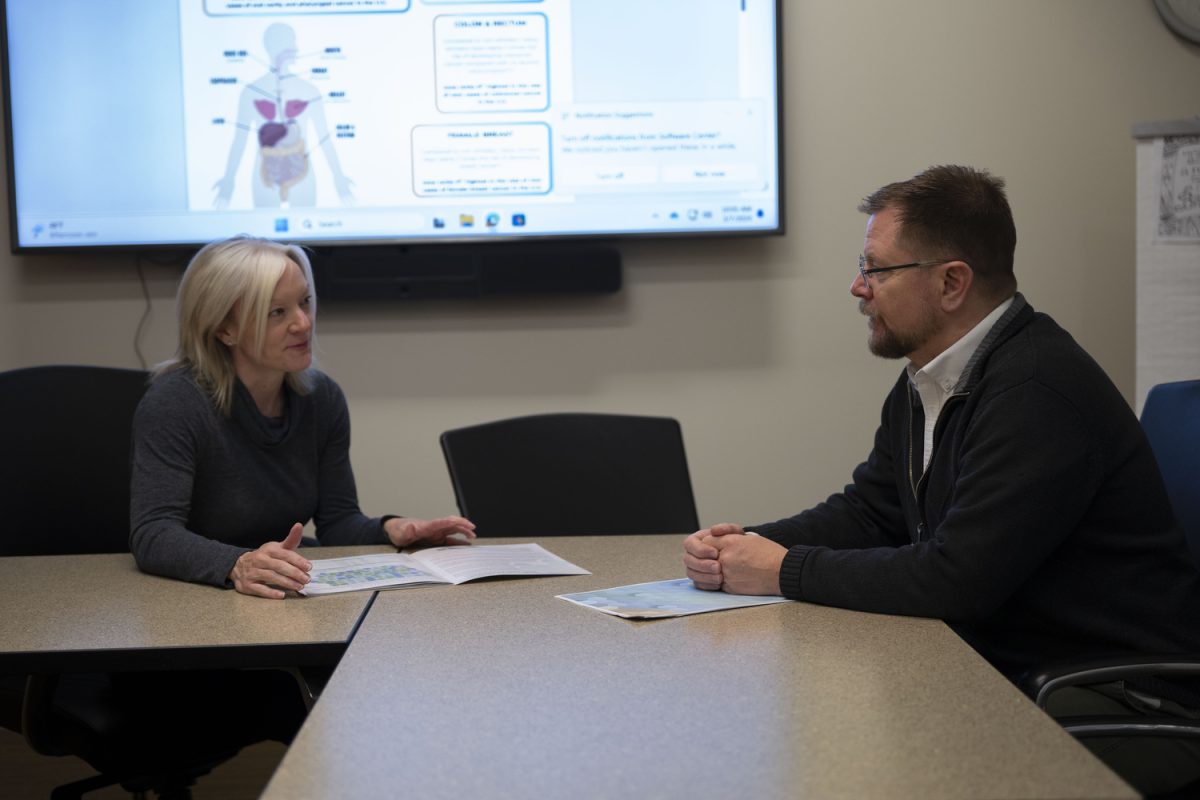Iowa continues to rank second in the nation for the highest, fastest-growing number of cancer cases, according to a report by the Iowa Cancer Registry released on Feb. 20. The overall cause of elevated cancer rates in Iowa remains unclear among researchers.
While the report released in February reflects there is no singular cause for cancer, alcohol consumption is one of the many risks the Iowa Cancer Registry sees as a common factor behind the state’s high ranking. Researchers encourage more action to address this finding.
Mary Charlton, director of the Iowa Cancer Registry and professor in the department of epidemiology at the UI College of Public Health, said there is still so much unknown and more opportunity for improvement for known risk factors.
According to the cancer rates by state, Kentucky is ranked first, then Iowa, Louisiana, Arkansas, and New York. It shows Iowa as the only Midwest state in the top ten, with Wisconsin ranking 12th. The data also shows the next closest state to Iowa on the ranking is Illinois, at 20th.
In 2023, Kentucky had a cancer rate average of 504.9 per 100 thousand people, with Iowa having a cancer rate average of 494.1 per 100 thousand people. The cancer rates by state also lists mortality by state, showing Iowa had 6,304 deaths by cancer in 2023 and was ranked 32 in the U.S. New York, which is ranked fifth on this list, had 32,955 deaths by cancer in 2023.
According to the Cancer Registry’s report, an estimated 21,000 new cases of cancer and 6,100 cancer deaths are expected in Iowa in 2024. Additionally, the report reflected Iowa’s ranking as the fourth highest for incidences of alcohol-related cancer in the U.S. and the highest in the Midwest.
According to Charlton, the Iowa Cancer Registry doesn’t collect risk factor data. Its researchers start collecting information once a patient is diagnosed.
“When we look at alcohol or smoking, we really rely on data or information at the National Cancer Institute or the American Cancer Society where they talk about known cancer risk factors, because those are things we know and those are things we can act on now,” Charlton said.
Charlton notes many other factors may contribute to Iowa’s high rankings of cancer.
The number of smokers in Iowa also may contribute to a higher risk of cancer in the state. Charlton said 15 percent of the population reports smoking.
Iowa also has a high risk for radon exposure. Radon is the No. 1 cause of lung cancer in non-smokers.
Exposure to limestone also increases the risk of cancer, and a large portion of Iowa is located on limestone deposits. Additionally, Iowa ranks 11th in obesity in the nation, and only one in five Iowans meet the recommended guidelines for physical activity, Charlton said.
She said data suggests Iowans do not eat enough of the nutrients that help repair damage in our bodies, as well as mentioned the environmental and genetic factors that contribute to high cancer rates.
Alcohol is not the only or even the most important risk factor driving the state’s cancer rates, Charlton said. Instead, alcohol works in tandem with other risk factors which can increase a person’s chances of developing cancer.
“Our purpose this year with the report was to build awareness that alcohol is a carcinogen and works in many different ways to contribute to our cancer risk,” Charlton said.
Paul Gilbert, a UI professor in community and behavioral health, was a consultant for the 2024 Cancer in Iowa Report. His research focuses on alcohol use, specifically patterns of consumption harms related to drinking.
“The younger you are when you start drinking regularly, the higher your risk,” Gilbert said. “Adolescence is a critical period for a lot of things that happen later in life, and alcohol use disorders may not show up for 10, 20, 30 years.”
Gilbert said most people only consider the short-term consequences of overindulging in alcohol when it could be a leading contributor to a future diagnosis.
“What folks generally don’t know are these long-term health effects that show up decades later: Cancers, cognitive decline, dementia, greater risk of stroke later in life,” Gilbert said.
Charlton said people are more vulnerable the younger they start drinking. As emphasized in the report, there is no single cause of cancer, but the consumption of alcohol can perpetuate the impact of carcinogens in the body, especially at a young age.
A UI study from 2023 exposed female adolescent mice to alcohol, investigating “the impact of adolescent alcohol consumption on mammary tumorigenesis and progression” and compared it to that of “adult alcohol exposure in animal models.”
RELATED: Iowa again ranks second for highest, fastest-growing number of cancer cases in US
Michael Henry, interim director of the UI Holden Comprehensive Cancer Center, described what the study showed.
“Their development of cancer was greatly accelerated. And not only that, but the cancer was more aggressive,” Henry said. “It showed that you could have exposure as an adolescent that would have long-term consequences.”
Henry said the study, which occurred for five weeks, shows if you have a single drink you won’t suddenly “wake up” with cancer. However, moving toward reducing alcohol consumption now can lower the risks of cancer later.
Gilbert said it’s unrealistic to ask Iowans to quit drinking, but “individuals making small changes, when you look at the whole state, will have a really big impact.”



